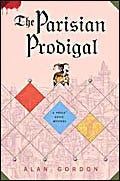The Parisian Prodigal is the eighth novel in the Fool's Guild mystery series, which imagines that medieval European jesters were organized into a secret guild. Medieval guilds were professional organizations that, among other things, required members to attain certain standards of mastery, serving a role similar to that served today by licensing standards for plumbers, contractors, and health professionals.
Husband-and-wife jesters Theo and Claudia have certainly mastered their profession. Like real medieval jesters, they speak truth to power, provoking laughter which disarms the sting in their words. Besides being skilled at juggling, tumbling, performing and prestidigitation, they are perceptive students of human nature, adept at ferreting out information pertinent to the powerful individuals they serve and discreet in using it: similar qualities to those a good private eye would need in a later century. So when a man turns up claiming to be the long-lost brother of Count Raimon of Toulouse, and shortly thereafter someone murders an expensive prostitute, it makes sense for Theo and Claudia to investigate.
Like a medieval morality play, The Parisian Prodigal is designed to entertain with humor and spectacle while satisfying its audience that evil will sooner or later be exposed and punished. The original morality plays didn't bother with historical research but placed Biblical events in contemporary settings. Gordon's mystery is better grounded in history, but the characters use breezily modern slang, with a similar sensibility behind it. The morality favored is the modern ideal of granting respect and compassion equally to men and women, rich and poor, saints and sinners. While that's hard to argue with as a value, some scenes will seem preposterous to readers versed in medieval history. But perhaps that's all part of the fun. Suspense plays second-fiddle to comedy, but the mystery is neatly plotted. Readers looking for a festival of jokes (mostly bawdy), an engaging cast of characters and a clever mystery set in a playful facsimile of the past will find much to delight them. (2010; 319 pages, including an Historical Note)




